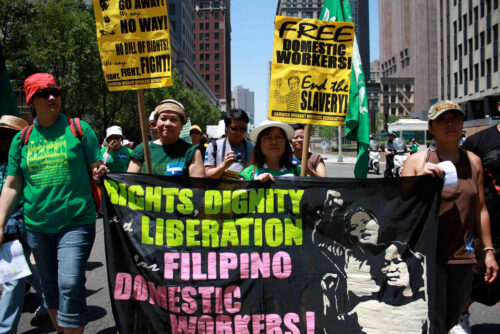Paper Dolls, a documentary film by Tomer Heymann, stands out in this regard.1 This film, about Filipino gay and MtF transgender caregivers in Tel Aviv who form a drag performance group called Paper Dolls, features scenes of caregiving that display these queer domestics’ compassion for their elderly Jewish employers. Sally, for instance, travels to the Philippines to visit her ill mother but returns to care for Haim, her elderly employer. At his death, she weeps at a distance from the gravesite and from the other funeral mourners. Her isolation visually articulates the intensity of her feelings as well as the social distancing experienced by many migrant workers. Paper Dolls juxtaposes this emphasis on caregivers’ affective investments in their work with an extended representation of their queer lives apart from that work. Scenes of their interpersonal relationships, pre-performance preparations, and performance excerpts, coupled with examples of harassment on the street and police security crackdowns, convey the Filipina/os pleasures and aspirations as well as the social and legal constraints threatening their livelihoods and even their lives.
In addition, the film highlights the gay male-identified filmmaker’s developing friendship with the Paper Dolls. The narrative moves from Heymann’s initial transphobic reactions, to his queer friends shaving his face, applying make-up and dressing him in women’s clothing, to close-ups of his grief in the departure lounge of the airport at the end of the film. Heymann’s unarticulated desires, like the performances and off-stage living spaces, provide in-depth depictions of migrant domestics that not only challenge the heteronormative assumptions underpinning most discussions of domestic work but also situate caregiving within a richer frame of workers’ lived experiences.
Filmic negotiations around the politics of visibility have resulted in a range of informative and compelling documentaries about domestic workers. Nuanced representations that balance agency and victimization, as in Chain of Love, Lakshmi and Me, and Paper Dolls, provide alternatives to Eurocentric rescue narratives by considering the desires, hopes, and pleasures, as well as struggles and humiliations, in the daily lives of domestics. Like debates about sex work, however, all these films, except Chain of Love and Paper Dolls, leave uninterrogated commonplace assumptions about the degrading nature of domestic work. Both of these films specifically discuss the pride caregivers take in their work as well as the neoliberal logics that position this as a devalued form of labor. Given the pedagogical value of these films, filmmakers need to continue to negotiate this complex representational terrain in order to make visible both the ideological and structural forces that maintain domestic work as a poorly paid and undervalued racial, gendered, class-based and increasingly transnational labor practice.
- Paper Dolls, Dir. Tomer Heymann. Strand Releasing, 2006. [↩]




